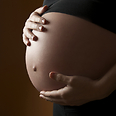
Women should be aware of the possibility of an effect, though small, said lead author Keren Agay-Shay of the University of Haifa.
"This is also important to decision makers, to understand all possible effects of climate change on" health, she told Reuters Health.
Studies with animals have sometimes found a link between hot weather during pregnancy and live young with structural problems of the heart. Only one previous study examined the association between outside temperatures and inborn heart problems in people, in 2012, and found no link.
Some heart defects heal themselves gradually, while others require surgery and may lead to disabilities over time. Mothers' infections with certain viruses, drug use and diabetes also increase the risk of complications, Agay-Shay said. But often, the cause of heart defects is not known.
Supported by the Israeli Ministry of Environmental Protection, researchers examined about 1,600 cases of heart birth defects among more than 135,000 babies born from 2000 to 2006.
They also looked at recorded temperatures from weather monitoring stations in the area of Tel Aviv, where the mothers lived during pregnancy.
The researchers took into account the average outside temperature and "extreme heat events" during the third to eighth week of pregnancy, when the fetal heart develops and starts to beat.
There was no association between outside temperature and heart defects over the entire year, according to results in the journal Human Reproduction.
When they looked at seasons individually, the researchers found a very slight increase in risk for multiple heart defects in babies of women exposed to unusually high temperatures during the cold season.
'Findings very far-fetched'
In Tel Aviv, winter temperatures averaged 59 degrees Farenheit, increasing to about 86 degrees in summer. Babies in the sensitive third to eighth week period when winter temperatures spiked to near summer levels - which happens a few times each year in Israel - were about 13% more likely to be born with multiple heart defects.
But even in the hot season, the rate of multiple heart defects was almost exactly the same as that seen worldwide. Some kind of congenital heart defect occurs in roughly five of every 1000 live births, including about 40,000 babies in the US each year, according to the Centers for Disease Control and Prevention.
Babies born with multiple defects are even more rare.
Still, a 13% increase in risk is not terribly small, Agay-Shay said. Such defects "are rare events but also very meaningful since they are the more severe cases," she told Reuters Health by email.
Researchers may have only found a significant effect in the cold season because people in Tel Aviv are used to hot, humid summers and are careful to use air conditioners, but may not be as prepared for high temperatures in the cold season, she said.
But Dr. Beate Ritz of the Fielding School of Public Health at the University of California, Los Angeles, believes the findings are very far-fetched.
What the study considered – a heat wave in the cold season – was what anyone would call perfect weather, in the high 60s to low 70s, she told Reuters Health.
The authors acknowledged in the study that temperature data and heart defect data were based on registries and may not have been entirely accurate, and that they had no information on how much time the mothers spent indoors.
Still, Ritz believes the subject deserves more study, and that if high temperatures really are linked to heart defects, summer, not winter, is the place to look.















